In another recent blog, we encouraged you to consider special needs kitties when looking to adopt. When choosing the right cat to welcome into your home, you may find that some of the cats at the shelters are labeled as being FIV+.
Feline immunodeficiency virus (FIV), similar to HIV in humans, is a retrovirus infection in cats.

According to Pet Web MD, the virus works by killing or damaging cells in a cat’s immune system, often targeting white blood cells. This leads to a weakened immune system and makes the FIV+ kitty vulnerable to secondary infection.
Due to widespread misinformation, many potential adopters miss out on the opportunity to bond with a kitty whose personality might match theirs perfectly simply because of their HIV+ status. According to the Virginia Beach Society for the Prevention of Cruelty to Animals (VBSPCA), FIV+ cats have long been considered “unadoptable”, and as a result, sadly, they’ve been euthanized in many shelters. That’s why it is important to know all the facts beforehand so you can make the right choice and hopefully not disclude FIV+ kitties from consideration.
FIV is Not Transmittable to Humans or Other Species
While FIV is basically a feline version of the human immunodeficiency virus (HIV) it is not the same virus and cannot be transmitted from a cat to a human. It also cannot be transmitted to a dog or other species of pet you may have in your household.
Mixing FIV+ and FIV- Kitties in the Household

Cat lovers should be happy to learn that FIV+ cats can live in the same household with non-infected cats. According to The Cat Network, FIV does not spread to non-infected cats if they share water bowls, food bowls, litter pans, or grooming tools with an FIV+ cat. It also doesn’t spread if an infected cat plays with an uninfected one. It is typically spread through street fights with tomcats when the fights result in deep bite wounds.
According to CatChat.org, the chances of an FIV+ cat passing on the virus to a non-FIV cat in the same home is as low as 1-to-2%. Spayed and neutered cats are typically more docile and less inclined to fight with other cats, which dramatically reduces the chances of FIV spreading to other cats. Because FIV is only spread through deep bite wounds, when two friendly kitties get a slow, proper introduction, it is highly unlikely that the virus would be spread to the non-infected kitty.

CatChat.org also informs that the majority of FIV+ cats are unneutered feral cats who engage in fighting to compete for food. (This is just one of the many reasons why it is so important to get cats spayed and neutered!)
It’s extremely rare for an infected mother cat to transmit the infection to her kittens. However, The Cat Network explains that kittens with an FIV+ mother may test positive for up to six months due to the presence of maternal antibodies, but these dissipate over time. So a positive kitten test will most likely result in a negative test when the kitten reaches six months.
FIV+ Kitties Live Long, Healthy Lives
Unfortunately, there is currently no cure for FIV. However, anyone seeking a lifelong feline companion will be relieved to know that FIV+ cats can live just as long and healthy a life as FIV- cats, according to The Cat Network. They may catch illnesses more easily because they are immunocompromised, which is why it’s critical to keep an FIV+ kitty strictly indoors. But, if the FIV+ kitty still does catch an illness, that simply means that he will need to see the vet as soon as possible, and he may need a stronger medication or may stay on medication for a longer period than FIV- cats typically would.

Overall, FIV+ cats require the same daily treatment as FIV- cats. They need a nutritious diet and a clean, comfortable home where they feel relaxed. A stress-free environment is also key to keeping them healthy.
Because of their weakened immune systems, FIV+ kitties should be taken to the vet for regular wellness exams to catch and treat any potential illnesses as soon as possible. If you want to be extra diligent, the VBSPCA suggests that you can get their blood and urine tested at the time of their exam to monitor their immune system.
Maybe the Most Important Thing to Know
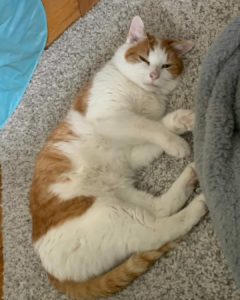
Last but certainly not least, an important part of adopting an FIV+ cat is understanding that these kitties are just as loveable and affectionate as non-infected kitties. They need to be loved and cherished in return, maybe even more than an FIV- kitty since, as mentioned above, keeping them happy and stress-free is good for their health. These kitties didn’t ask to be put outside, unneutered and infected. It is because of irresponsibly humans that they end up FIV+. Loving and caring for an FIV+ kitty that has been rescued is a great way to help make that up to them.
Cat Tales has helped many FIV+ kitties find loving homes over the years and usually has a few available for adoption at any given time. If you’d like to provide a loving home to an FIV+ kitty, send an email to our info@cattalesinc.org address to inquire about which kitties are available.

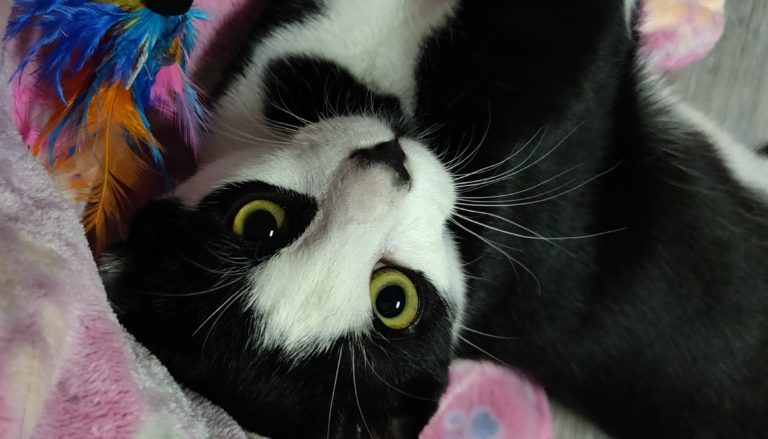


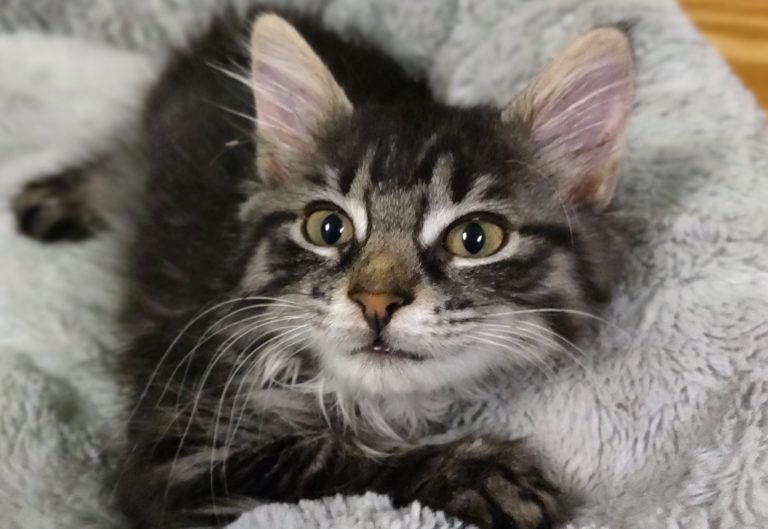
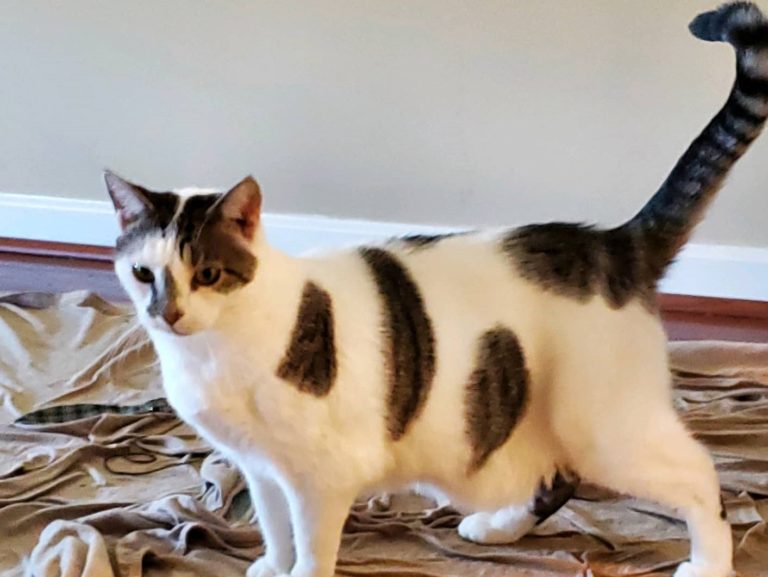
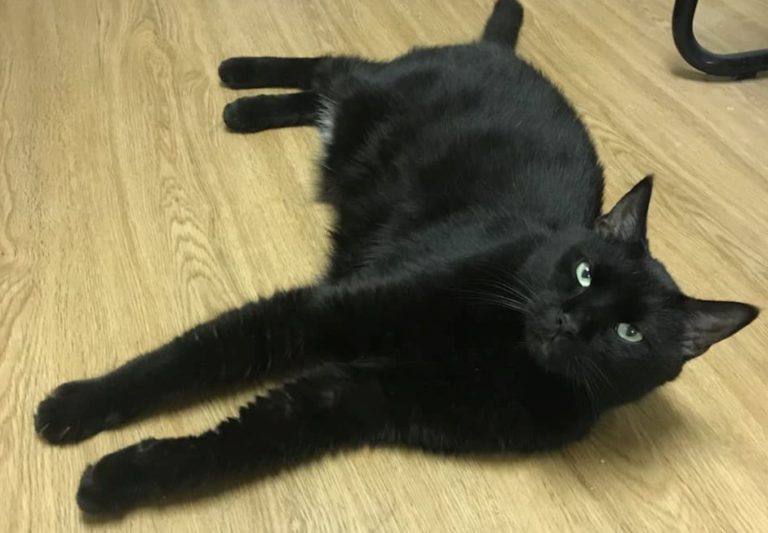
I recently lost my loving kitty of 13 years to FIV. He was infected during a cat fight one night when he accidentally got outside. He bravely battled and lasted 6 years being fiv+. These FIV + kitties are just as loving as any other. My heart is broken at his passing. I had him euthanized because I did not want to see him suffer. I am looking forward to adopting even another kitty even if it is FIV +.
Thanks for letting me share.
Just heard from the Vet in Stayton, OR that a kitty that came to my porch ,is 12+ years, and has FIV, bad teeth, etc. Likes being petted, but is a little on the wild side. Has a very deep meow. Have my son’s cat, and can’t mix them. Wish I knew someone who could take her.
I have a friend that was put in nursing home and has a cat that needs a new home.
5-6 years old and good cat but scared.
It’s in the house and I go feed it every other day.
Please help me get this poor baby out of this situation.
Thank you,
Desireeeick@gmail.com